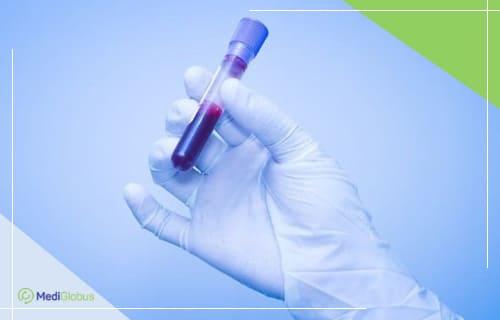The cancer marker test is one of the universal methods of cancer diagnosis. It is used to determine the type and stage of cancer, its grade, the tumour’s response to treatment, the choice of medication and monitoring of remission.
In this article, we will tell you more about what parameters doctors most often check when testing for cancer markers, explain what they mean and answer common questions from our patients.
Listen to the article:
What are cancer markers?

Cancer markers are proteins or other organic elements whose presence in the body often indicates a cancerous process. Tumour markers can be compounds secreted by the tumours themselves or those produced by the immune system in response to disease.
Cancer markers can be found in various tissues of the body – blood, urine, faeces, etc. In addition, cancer cells themselves can spread through the body, which carries important diagnostic information for doctors. By isolating them, it is possible to detect specific cancer mutations and select modern treatments such as targeted therapies.
Some cancer markers are associated with a single type of cancer, while others may indicate several different cancers.
Medical protocols used in foreign clinics prescribe a thorough diagnosis of the entire body when elevated levels of cancer markers are detected. Regular check-ups can give a chance to detect cancer in its early stages, when its treatment is the most effective and safest.
Cancer markers are often measured during cancer treatment to monitor the effectiveness of the drugs. Because this procedure is safe and painless, it can often be performed without risk to the patient and produces reliable results.
Up to 40% of cancer patients who seek a second opinion come in initially misdiagnosed. If they had not contacted another doctor in time, it could have cost them their health or even their lives. MediGlobus can help you find an experienced oncologist for a face-to-face or online consultation. To contact us, click the button below and leave your contact information
What cancer markers should I take during a cancer diagnosis?
Hundreds of different cancer marker tests are used in medicine. When diagnosing a disease, the doctor will select a test based on the type of cancer suspected from the symptoms and other tests. If the type of disease has already been established, there are specific protocols indicating which cancer marker tests to take.
Most often, patients are interested in a set of cancer marker tests for men or women. It is aimed at detecting common cancers among a specific age and sex group.
A list of common cancer markers for women:
Choriongonadotropin (HCG),
Cancer antigen CA-125,
Beta human chorionic gonadotropin (beta-HCG),
Alpha-fetoprotein (AFP),
Inhibin,
Estradiol (E2),
Carcinoembryonic antigen (CEA),
Squamous cell carcinoma antigen (SCC).
List of common cancer markers for men:
Prostate-specific antigen (PSA),
Prostatic acid phosphatase (PAP),
Cancer antigens CA-125, CA 19-9, CA 5-3, CA 27-29,
Carcinoembryonic antigen (CEA),
Alpha fetoprotein (AFP),
Choriongonadotropin (HCG),
Lactate dehydrogenase (LDH),
Neuron-specific enolase (NSE),
Bladder tumour marker studies.
For the selection of targeted therapies, foreign clinics routinely perform a standard test for cancer markers in tumour tissue, which is also sometimes called a biomarker test. It differs from the standard cancer marker test in that it searches for specific genetic mutations rather than proteins. This is related to the mechanism of action of targeted therapies, as these drugs look for mutations on the surface of cells to distinguish healthy cells from cancerous cells.
In addition, a biomarker test is done to determine whether hormone therapy is indicated for a cancer patient. This can be an effective treatment for conditions such as breast or prostate cancer.
In some cases, such as if a surgical biopsy is contraindicated for a patient, doctors can check biomarkers by blood tests. To do this, special tests are carried out to “catch” micro-particles of cancer cells from the bloodstream and analyse them. Such tests can detect up to 324 mutations associated with cancers such as non-small cell lung cancer, breast cancer, melanoma, etc.
Home pregnancy tests measure HCG levels in the blood. Some men with testicular cancer may have elevated levels of this hormone, which may result in a positive pregnancy test. This method is not an alternative to laboratory tests, as it can show a false negative result. However, it does serve as a warning sign and a reason to see a specialist. The media knows of more than one case in which cancer in men was accidentally detected in this way.
What are the normative cancer marker levels?
It is important to remember that cancer marker normative levels can vary depending on the manufacturer of the test used. In addition, normal protein levels differ between people of different ages, which is particularly true for markers used to diagnose gynaecological cancer. Abnormal levels of tumour markers can also occur in benign processes, inflammatory diseases and pregnancy.
The obtained results of the analysis for cancer markers should not be taken as a sentence, because without additional diagnostics and comprehensive evaluation by a doctor, they are not indicative.
Below are some of the most common indicators:
| Type of cancer marker | For which cancers it may be elevated | Normal cancer marker levels | Which non-oncological diseases may elevate the levels |
|---|---|---|---|
| CA-125 | Ovarian cancer and other gynaecological cancers | Less than 46 U/ml | Pregnancy, menstruation, endometriosis, ovarian cysts, fibroids, pelvic inflammatory disease, pancreatitis, cirrhosis, hepatitis, peritonitis, pleural effusion, after surgery or paracentesis |
| HE4 | Ovarian cancer, endometrial cancer | Less than 85 pmol/l | Age, renal failure, benign gynaecological tumours |
| CA 72-4 | Gastric, pancreatic, colorectal, breast and ovarian cancers | Less than 4-6 U/ml | Benign gynaecological tumours and GI diseases |
| CA 242 | Pancreatic cancer, adenocarcinomas, risk of metastasis | Less than 20.0 U/ml-1 | Benign tumours of the liver, pancreas and gallbladder |
| S100 | Breast cancer, lung cancer, melanoma and soft tissue sarcomas | Less than 0.10 µg/L | Liver and kidney disease |
| CA 19-9 | Pancreatic cancer | Less than 30 units/ml | Pancreatitis, ulcerative colitis, inflammatory bowel disease, inflammation or blockage of the bile duct, thyroid disease, rheumatic arthritis |
| HER2 | Breast, bladder, pancreatic, ovarian and gastric cancers | Less than 20.9 ng/ml | Misinterpretation of test results |
| hCG | Ovarian, prostate, breast, lung cancer | Less than 5 mIU/ml in women, less than 2 mIU/ml in men. During pregnancy, normative values increase according to the term | Pregnancy, marijuana use, hypogonadism, cirrhosis of the liver, inflammatory bowel disease, duodenal ulcers |
| PSA | Prostate cancer | Under 50 years – less than 2.5 ng/ml, under 60 years – less than 4.0 ng/ml | Benign prostatic hypertrophy, nodular prostatic hyperplasia, prostatitis, prostate trauma/inflammation, ejaculation |
| AFP | Liver cancer, lymphoma, Hodgkin’s disease, renal cell carcinoma | 10-20 ng/ml for adults | Pregnancy, hepatitis, cirrhosis, inflammatory bowel disease |
| Beta-2 microglobulin | Multiple myeloma, some types of leukaemia, lymphoma | Blood – 0.70-1.80 µg/ml, urine – ≤300 µg/l, cerebrospinal fluid – 0-2.4 mg/l | Kidney disease, hepatitis |
| Chromogranin A (CgA) | Neuroendocrine tumours (carcinoid tumours, neuroblastoma) | Less than 93 ng/ml | Proton pump inhibitors (drugs prescribed to reduce stomach acid in gastritis) |
If you are not sure if the diagnosis you have received is correct, you can consult a foreign doctor. You will send the results of the tests performed in the laboratory at home and the doctor will clarify the diagnosis/treatment or prescribe additional tests.
How do I prepare for a cancer marker test?
Most cancer marker tests are non-invasive and do not require special preparation.
The levels of some cancer markers may be related to a woman’s menstrual cycle. When prescribing the test, the doctor will specify on which day they should be taken.
It is preferable to allow 4 hours after the last meal before the test.
It is recommended to give blood in the morning, between 8 and 11 hours, and avoid food overload the day before.
Alcohol intake should be avoided on the eve of the test.
Do not smoke for a minimum of 1 hour before the study.
Exclude physical and emotional overload on the eve of the study.
Laboratories may use different types of analyses to measure cancer markers, so the results may not be comparable. When undergoing a series of examinations, it is preferable that all tests are performed using the same type of test at the same laboratory.
Frequently asked questions about cancer marker testing
Can chemotherapy cause cancer markers to rise?
Chemotherapy can cause a temporary increase in cancer marker levels. This is because the treatment causes cancer cells to die quickly and release large amounts of measurable proteins.
Can the CA 125 cancer marker rise in pregnant women?
The CA 125 protein can indeed rise during the first trimester of pregnancy, but not to levels typical of ovarian cancer.
How reliable are cancer markers?
In the past, cancer marker testing has been widely used in check-ups as the primary method of cancer detection. However, recent studies by independent scientific organisations show that such tests may sometimes not detect cancer in genuinely ill patients or may give false positive results. Therefore, people who are at risk – such as patients in remission – are advised to undergo more thorough and comprehensive tests. Several new alternatives to cancer marker tests are under development. The preliminary accuracy of these tests is 65-83%.
Can cancer markers be normal in cancer?
Yes, some patients can have normal cancer marker test results even when cancer is present. This is why a battery of tests is used for diagnosis. Some cancers do not produce tumour markers that are detectable in the blood. Other cancers have no known cancer markers.
Do cancer markers always show cancer?
No, not always. For example, non-cancerous diseases can sometimes cause levels of certain cancer markers to rise. Also, not all people with a certain type of cancer will have elevated levels of protein associated with that cancer. Therefore, measurements of circulating cancer markers are usually combined with the results of other tests, such as biopsy or imaging, to diagnose cancer.
Advantages of seeking a cancer marker test abroad
Modern laboratories certified by international health standards monitoring organisations. They use quality cancer marker test kits and get fast results.
The expertise of experienced oncologists. Clinics that specialise in cancer treatment hold boards of oncologists to make a diagnosis and choose a treatment plan. Patients can get the opinion of experts with more than 20 years of experience in treating their particular type of cancer.
Advantageous check-up packages for comprehensive health diagnostics, prevention of serious diseases and control of cancer in remission. Foreign clinics offer different packages depending on the gender and age of the patient and the risk of specific diseases.

Individualisation of treatment. Thanks to genetic analysis of tumour tissue, doctors at foreign clinics can more accurately tailor chemotherapy and targeted therapy drugs to treat cancer. This increases the chance that the tumour will respond to the medication.
Cancer treatment can often require long hospital stays. Foreign hospitals have comfortable deluxe rooms, caring staff and special facilities for people with limited mobility. This reduces the stress of undergoing treatment and allows you to concentrate fully on your recovery.
Summary
Cancer marker testing is a diagnostic procedure used in oncology to diagnose cancer or to obtain additional information for a treatment plan. The most common use of tumour markers is during cancer treatment to monitor the progress and effectiveness of therapy.
There are more than 300 different cancer markers. Some of them indicate the presence of a particular type of cancer in the body, while others may be produced by different cancers.
Cancer marker testing can give false positive and false negative results, so it is not used as a stand-alone diagnostic method, but only in combination with other tests – biopsy, imaging, etc.
Cancer marker analysis is often used to select effective drugs to fight cancer: chemotherapy, targeted therapy, etc.
APPOINTMENT FOR A CONSULTATION
To see a foreign oncologist, click on the button below and fill out the form. Our coordinators will call you back within 30 minutes. They will provide all the necessary information and help you with travel arrangements.
Sources:
- 1. National Cancer Institute
- 2. Acta Obstetricia et Gynecologica Scandinavica
- 3. The Abramson Cancer Center of the University of Pennsylvania
- 4. An American Society of Clinical Oncology Journal
- 5.Korean Journal of Gastroenterology
- 6. Tumor Biology & Bariatric Surgery






